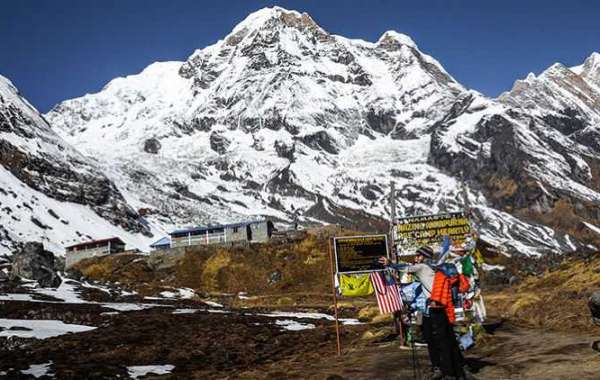Nestled in the heart of the Himalayas, the Annapurna Base Camp Trek offers an unforgettable adventure for trekkers seeking a blend of breathtaking landscapes, diverse cultures, and a sense of accomplishment like no other. With its stunning vistas, charming villages, and the mesmerizing Annapurna massif as its backdrop, this trek has become a bucket-list item for many outdoor enthusiasts. In this complete guide, we'll delve into the essential information you need to know before embarking on the Annapurna Base Camp Trek.
Overview:
The Annapurna Base Camp (ABC) Trek, also known as the Annapurna Sanctuary Trek, is a popular trekking route located in the Annapurna Conservation Area of Nepal. This region is renowned for its diverse ecosystems, ranging from lush subtropical forests to alpine meadows and barren landscapes. The trek culminates at the base of Annapurna I, the 10th highest mountain in the world.
Trekking Duration:
The trek typically takes around 7 to 12 days to complete, depending on the route chosen and the pace of the trekker. The journey encompasses a variety of landscapes, providing a balanced mix of challenges and rewards.
Best Time to Trek:
The ideal trekking seasons for the Annapurna Base Camp Trek are spring (March to May) and autumn (September to November). During these times, the weather is generally stable, and the skies are clear, offering the best views of the surrounding mountains. The temperatures are moderate, making it conducive for trekking.
Permits and Regulations:
Trekkers need to obtain two main permits for this trek: the TIMS (Trekkers' Information Management System) card and the Annapurna Conservation Area Permit (ACAP). These permits can be obtained in Kathmandu or Pokhara. It's important to abide by local regulations and respect the environment to ensure sustainable trekking in the region.
Fitness and Experience:
While the Annapurna Base Camp Trek is considered moderate in terms of difficulty, it still requires a certain level of physical fitness. Regular exercise and some trekking experience are beneficial. Gradual acclimatization is key to preventing altitude sickness, so it's important to plan for rest days during the trek.
Itinerary:
The trek can be tailored to fit different timeframes, but a typical itinerary might look like this:
- Day 1: Kathmandu to Pokhara
- Day 2: Drive to Nayapul, trek to Tikhedhunga
- Day 3: Trek to Ghorepani
- Day 4: Early morning hike to Poon Hill, trek to Tadapani
- Day 5: Trek to Chhomrong
- Day 6: Trek to Bamboo or Dovan
- Day 7: Trek to Machapuchare Base Camp (MBC)
- Day 8: Trek to Annapurna Base Camp (ABC)
- Day 9: Trek back to Bamboo or Dovan
- Day 10: Trek to Jhinu Danda (hot springs)
- Day 11: Trek to Nayapul, drive back to Pokhara
- Day 12: Return to Kathmandu
Accommodation:
Teahouses and lodges are available along the route, providing basic accommodation and meals. These stops offer a chance to interact with fellow trekkers and experience the local culture.
Packing Essentials:
Packing wisely is essential for a successful trek. Be sure to bring proper trekking gear, including sturdy boots, layers of clothing, a good-quality sleeping bag, a trekking pole, a first aid kit, and toiletries.
Cultural Experience:
One of the unique aspects of the Annapurna Base Camp Trek is the opportunity to experience the local culture. The trek takes you through villages inhabited by Gurung and Magar communities, allowing you to observe their way of life, traditions, and architecture.
Conclusion:
The Annapurna Base Camp Trek is a remarkable journey that promises unforgettable moments and a deep connection with nature and culture. From the lush forests to the rugged terrain, and finally standing at the base of the majestic Annapurna, every step is a testament to the beauty and power of the Himalayas. Proper preparation, a spirit of adventure, and respect for the environment will make this trek an enriching and transformative experience.









